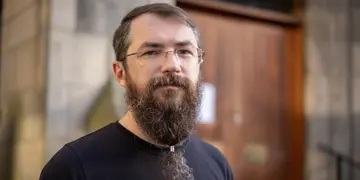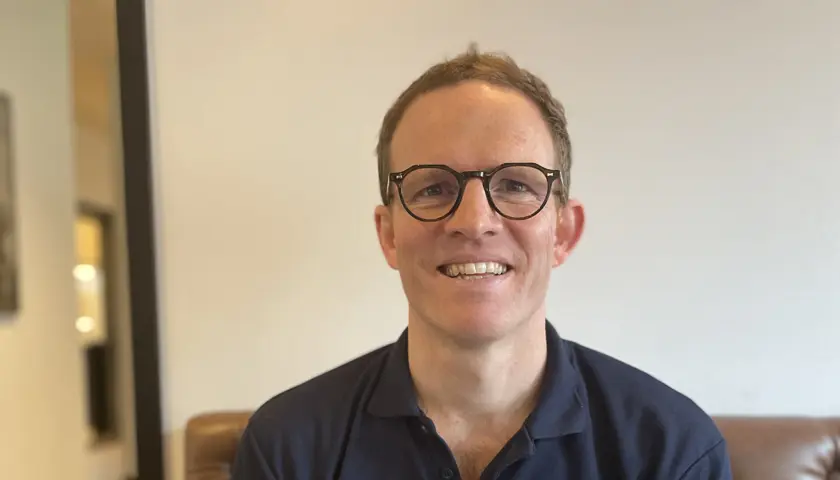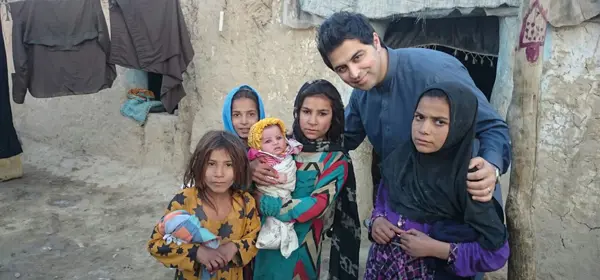Warzone ready
Warzone ready
Working in hostile environments requires exceptional skills and the need to make difficult, often heartbreaking decisions. Doctors have the chance to learn from some of the best in the business at the course run by the David Nott Foundation
Asked if he has ever felt if his life is in danger, Yaroslav Kulachek gives a short laugh. ‘Multiple times,’ he says, as if it is the most natural thing in the world. ‘We laugh when we survive – we laugh and say to each other “they missed”. But we laugh to protect ourselves.’
Dr Kulachek (pictured above), 38, is a general surgeon in Ukraine. He works in an area which has been the scene of some of the most intense fighting since the Russian invasion where many civilians have been injured and lost their lives.
It is an intense existence, where he is on-call 24-hours a day and never knows what will come to his operating table – or whether he and his colleagues will be able to help. He is – protective laughing notwithstanding – also constantly at personal risk.
However, now he is in Edinburgh, attending a five-day HEST (Hostile Environment Surgical Training) course run by the David Nott Foundation in conjunction with the Royal College of Surgeons of Edinburgh.
‘I’m here because I want to expand my skills and abilities,’ says Dr Kulachek. ‘But, when I go back to Ukraine, I will also be able to share this knowledge with my colleagues so that we can save more lives.’
Hostile environments
This goes to the heart of this course, and, indeed, to the work of the David Nott Foundation in general. Founded by Professor Nott and his wife Elly, the foundation was set up to train doctors in countries hit by conflict, disaster and catastrophe.
The foundation was a recipient last year of a grant from BMA Giving, which supports UK-registered charitable groups in their healthcare initiatives.
It also provides training for doctors from the UK and elsewhere who – like Prof Nott – want to use their skills on a humanitarian basis wherever they are needed. Participants are taught by some of the best in the business how to work in hostile environments where resources and staff might be thin on the ground, and where they might realistically come under threat themselves.
They learn how to make decisions in the toughest of circumstances – including when they should take the heartbreaking decision not to attempt to help a patient because it would be futile and waste precious time and resource that might otherwise save many more people.
The David Nott Foundation is covering Dr Kulachek’s costs for the HEST course, and those of two other doctors from Ukraine. The idea is that once they go back to Ukraine, they will become ‘faculty’ and work with the foundation to deliver similar training, making sure knowledge and skills reach the front line.
When I go back to Ukraine, I will also be able to share this knowledge
Yaroslav Kulachek
As Dr Kulachek implies, this is a special course. Most of those taking part – and it attracts medics from across the world – are paying hefty fees to do so, which is not surprising. The number and calibre of the educators is high and the ‘gold-standard’ training also includes the use of cadavers, which are a precious and expensive resource.
The Doctor magazine attended the fifth day, which focused on gynaecology and obstetrics. As well as sophisticated prosthetic models which allowed the participants to practise difficult births, for example, the lecture rooms contain more homely props. There are trays of oranges, which have been drawn on with inky shapes to represent the different sections of a newborn’s head.
There are also bundles of papayas, a fruit that apparently makes an excellent uterus. The educators include midwives and gynaecologists, who are clearly aware that most of the people attending the course are surgeons and may have scant experience of obstetrics.
Also present is David Nott himself, who is sharing his own experiences of having to rapidly upskill himself to deliver babies safely in conflict and disaster zones. At one point he hovers above a doctor trying to remove a plastic baby from a mannequin and passes on a tip about using suction, which he picked up from a nurse in Congo.
It’s this sense of authenticity, of grounded-ness, which permeates the day – there’s a real feeling the teachers are people who have been there who want to share their experiences and train up the next generation of doctors prepared to go to work in conflict zones.
There are many who want to do so, regardless of age or stage of career. For example, Bernhard Wolf, aged 63, is a consultant surgeon at Raigmore Hospital in Inverness. ‘I’m reaching the end of my NHS work now and thinking of doing other things. I’ve been interested in humanitarian work for years but my NHS practice was always too busy,’ he says.
Colleagues in Inverness have been to Ukraine and Gaza, he adds, which has whetted his appetite to do similar – although he admits his wife isn’t keen on the idea. ‘We have some domestic discussions to do,’ he says.
Ka Yin Cheung, aged 49, is a general surgeon in Hong Kong. ‘I’ve been thinking about doing some humanitarian work and wanted to broaden my knowledge and be prepared,’ she says. ‘The course has made me feel more confident about what to do – and what not to do. Learning about a war zone, and about the environment there, has helped me with my mental preparation.
It is also attracting resident (formerly junior) doctors, such as Ganga Gurung, who is a senior house officer in emergency medicine in Hereford. ‘I’m interested in surgery, and in humanitarian work as well,’ she says. ‘This training is multi-system and covers all specialties and tells you what you need to do.’
Some aspects of the five-day programme were completely new and somewhat alien to her, she says – such as the session the previous day on how to make firearms safe. But while this is a skill unlikely to come up in a medical royal college membership exam, it is one the David Nott Foundation thinks is important, as chief executive James Gough, a former military doctor explains from his own experience.
‘I was working at a US trauma centre and was about to do CPR on a patient who happened to have a loaded handgun underneath them. So, of course you don’t want to be doing CPR on someone with a loaded handgun but the broader point is that, yes, we do teach them about what to do.
‘It’s a short session, just 25 minutes, and it means you don’t completely freak out if there’s an AK-47 lying on the bed, and it is loaded and you don’t know what to do with it. I think it gives people reassurance they can make these weapons safe and carry on caring.’
While it takes a special kind of person to leave the security of a homeland such as the UK and make short humanitarian trips to war and disaster zones, for the likes of Dr Kulachek there is no option. ‘We work and deal with a hostile environment,’ he says.
‘The war zone is always shifting, it is dangerous and we have a lack of resources, a lack of people, lack of specialties, lack of doctors, lack of everything. This course gives us a huge opportunity to improve our capabilities in decision-making. Without it, there will be more cases where we will say, “I don’t know how to manage it”. Now we can say, “I can make it, and I will give this person a chance to survive and to live properly”.’
Find out more about BMA Giving
(Images by Jennifer Trueland and Matthew Saywell)





